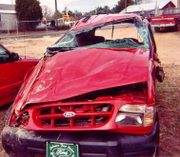I called my ISP today about the
Investment Strategy spam detailed yesterday.
They added RBL support to my e-mail account. This has slowed the
delivery of that spam but (interesting) has not stopped it entirely.
This got me thinking about cars.
For 50 years now car companies and
safety advocates have been busy making cars safer. We now have seat
belts, and airbags, and rollover protection, and anti-lock brakes,
and computers that supposedly keep us from doing other stupid things.
What has happened to your risk of
having an accident in that time, to your risk of dieing on the road?
Nothing. Well, very little.
What has happened is that, as all these
new safety features came online, people drove faster, and more
recklessly. A few years ago we got a speed bump on my street, because
people were blazing through at 35 and the road is barely wide enough
for one lane of traffic (plus a lane of parking). Now, a few years
later, the same hosers race to the bump, hit their brakes, cross the
bump, then race to the end of the street.
The only thing that seems to have
changed driving behavior in my memory is high gas prices. When the
price was over $3/gallon, it seemed, people thought about their
trips, and they thought about their driving. They slowed down. Most
drove at a similar speed. Now, with prices down to $2/gallon again,
it’s hell-bent-for-election and daily traffic jams on all the major
freeways due to accidents.
There seems to be an unspoken agreement
among drivers about the risk they are willing to accept on the
highway. It’s a stupid risk-reward equation, but there it is. The
reward of getting there a few minutes earlier balanced by the risk of
sudden, horrible painful death.
The same balance seems to be taking
place on the Internet.
We seem willing to accept a certain
level of pollution in the streams of story because there are people
who fight it. The anti-spam actions of my ISP slowed my spam flood,
so I’m no longer so upset. But all that spam is still going out,
tieing up servers, tieing up bandwidth. The same is true for viruses
and other computer threats – the enormous expense and development
of anti-crime threats has made the apparent risk appear to be level.
The arms race goes on out of sight, and so it’s out of mind.
There is a Nobel Prize here for whoever
can figure this out with some scientific precision, this unconscious
balance of perceived risk, real risk, and behavior.
Maybe in economics.













Money is the greatest measure of motivation. Make fast driving expensive and you’ll see less of it. Even with the finest spam filters available (that would be SpamBayes, see spambayes.sourceforge.net) we aren’t addressing the motivation. Someone is getting paid to send that crap, and someone is paying for it. Until we come up with a way to deal with that, little will change.
As for the personal decision to speed when it’s affordable, it’s not a question of getting there a few minutes earlier against a gruesome violent death, it’s getting there a few minutes earlier tens of thousands of times against one gruesome violent death. Since the vast majority of people die in other ways, the risk analysis is apparently not too far off.
On the other hand, slowing down in every way, certainly in many ways, has powerful benefits, but that’s a different math.
Van
Money is the greatest measure of motivation. Make fast driving expensive and you’ll see less of it. Even with the finest spam filters available (that would be SpamBayes, see spambayes.sourceforge.net) we aren’t addressing the motivation. Someone is getting paid to send that crap, and someone is paying for it. Until we come up with a way to deal with that, little will change.
As for the personal decision to speed when it’s affordable, it’s not a question of getting there a few minutes earlier against a gruesome violent death, it’s getting there a few minutes earlier tens of thousands of times against one gruesome violent death. Since the vast majority of people die in other ways, the risk analysis is apparently not too far off.
On the other hand, slowing down in every way, certainly in many ways, has powerful benefits, but that’s a different math.
Van